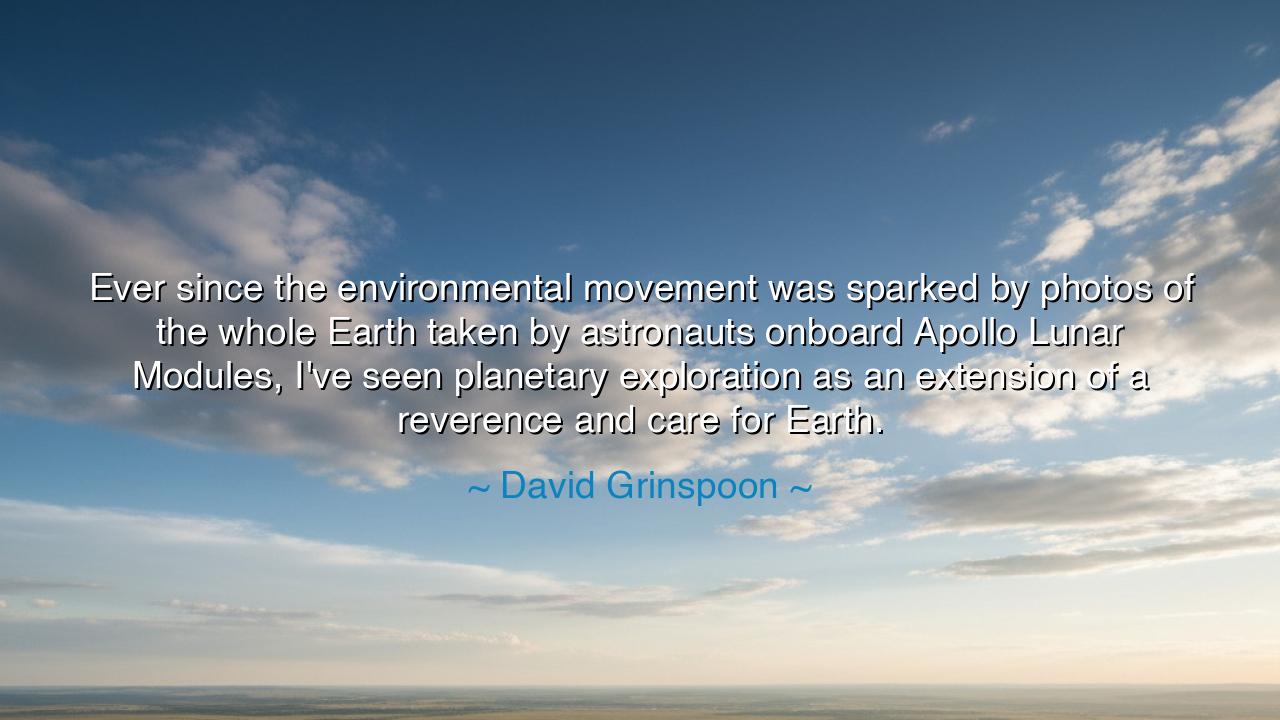
Ever since the environmental movement was sparked by photos of
Ever since the environmental movement was sparked by photos of the whole Earth taken by astronauts onboard Apollo Lunar Modules, I've seen planetary exploration as an extension of a reverence and care for Earth.






Hear the words of David Grinspoon, spoken with wonder and reverence for both heaven and earth: “Ever since the environmental movement was sparked by photos of the whole Earth taken by astronauts onboard Apollo Lunar Modules, I’ve seen planetary exploration as an extension of a reverence and care for Earth.” These words reach across the boundaries of science and spirit, calling us to see not separation but unity: that the exploration of the cosmos is not an escape from Earth, but a deepening of our duty to cherish it.
The meaning of this quote rests in the power of perspective. When the astronauts of Apollo turned their cameras homeward, the world saw, for the first time, the fragile blue sphere suspended in darkness. That single image, the “Blue Marble,” awakened millions to the truth that Earth is not boundless, not indestructible, but small, finite, and precious. This vision ignited the modern environmental movement, reminding humanity that to harm the Earth was to harm ourselves. Grinspoon speaks as one who inherited that revelation: that to gaze outward at the planets is to be reminded of the uniqueness and sanctity of our own.
The origin of these words lies in the great space race of the twentieth century. The Apollo Lunar Modules, built to conquer the Moon, inadvertently offered a greater victory: the sight of Earth as one. No borders, no nations, only oceans, clouds, and continents, fragile and whole. This perspective united science and morality, sparking movements for clean air, clean water, and the protection of ecosystems. Grinspoon, a planetary scientist, saw in this moment the seed of a larger truth: that the study of other worlds is not a distraction from caring for our own, but an extension of that same care.
History gives us echoes of this truth. When the Polynesian navigators set sail across the Pacific, they did not only map new islands; they learned the rhythms of wind, wave, and star. Their exploration deepened their reverence for the sea that sustained them. So too with the modern voyager: as we probe Mars, Venus, and the moons of Jupiter, we discover not only the secrets of the cosmos but the fragility of our home. Where Venus warns of runaway greenhouse heat, and Mars whispers of lost water and vanished life, we are taught lessons of what Earth may become if we are careless. Thus, planetary exploration becomes both mirror and teacher.
The lesson is profound: to explore the heavens is to be reminded of the singular miracle of Earth. To peer at barren worlds is to recognize the abundance of our own. To study desolation elsewhere is to be moved to prevent it here. Reverence and care for Earth is not diminished by exploration but magnified. The greater the distance we travel into space, the deeper our gratitude for the world that gave us birth.
What then must we do? As citizens of Earth, we must not treat space as an escape route from a wounded planet, but as a lens through which to better protect it. Support the sciences that explore other worlds, for in them lie warnings and wisdom for our own. At the same time, live daily as stewards of Earth—conserving resources, protecting waters, cherishing forests—so that the image first captured by Apollo remains vibrant, not scarred. Let exploration inspire responsibility, not neglect.
Thus, remember the words of David Grinspoon: “Planetary exploration is an extension of reverence and care for Earth.” Teach this truth to the generations: that to gaze upon the stars is not to abandon home, but to return to it with greater awe. For Earth is not merely a planet among billions, but the cradle of life, the garden in the void. And only by loving it fiercely, even as we wander far, will we honor the gift revealed when the Apollo astronauts first turned their eyes back upon the whole Earth.






AAdministratorAdministrator
Welcome, honored guests. Please leave a comment, we will respond soon